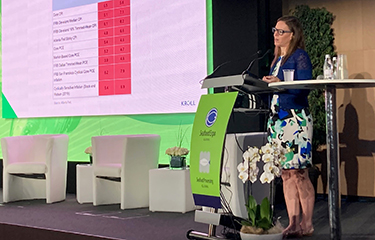The U.S. Federal Reserve has long targeted 2 percent inflation in its economic policy, but that era could be coming to an end, according to Kroll Institute Global Chief Economist Megan Greene.
Greene delivered the keynote address at the 2023 Seafood Expo Global on 26 April, 2023, dedicating much of her talk to addressing the seafood industry’s concerns over inflation.
The conference program at this year’s expo includes more than 20 educational sessions by more than 85 international experts in the seafood sector, from marine professionals and prominent policy makers to entrepreneurs, economists, NGO representatives, and experts in biodiversity and sustainability.
The conference schedule for Thursday, 27 April, the last day of the 29th edition of Seafood Expo Global/Seafood Processing Global, will feature the panel discussion "How Can Marine Ingredients Support the Growth of the Aquaculture Sector in a World of Greater Food Sovereignty,” providing an overview of ways to increase the availability of sustainable marine ingredients, and "Global Logistics Outlook," which will deliver an update on sea and air shipping and logistics.
This year, for the first time, video recordings of all the conference sessions are included in the conference registration.
In her lecture, "Navigating the Global Polycrisis,” Greene, a senior fellow at the Mossavar-Rahmani Center for Business at the Harvard Kennedy School, Financial Times columnist, and professor at Brown University's Watson Institute for International and Public Affairs, examined how different risks and factors – such as the reopening of China and global indebtedness – will impact the global economy in the coming months and years.
Greene warned the likelihood that inflation will be a long-term global issue is high, but said “business expectations and consumer confidence are improving.”
Since 2012, the 2 percent target inflation rate has been the official policy of the U.S. Federal Reserve, following the belief that number best achieves maximum employment and price stability. Japan, Canada, Australia, and Israel are other prominent federal economies have set their target inflation rates at 2 percent, according to the International Monetary Fund.
“When households and businesses can reasonably expect inflation to remain low and stable, they are able to make sound decisions regarding saving, borrowing, and investment, which contributes to a well-functioning economy,” the Federal Open Market Committee said in a statement on the issue.
The 2 percent goal has precedent dating back to the 1980s, but many economists are now beginning to rethink the number. For her part, Greene said she believes the Fed will eventually settle on 3 percent as its new target.
“I think we might be looking at roughly 3 percent inflation, rather than struggling to get inflation to 2 percent, in part because of this factor that we've got an aging population,” she said. “So structurally, I think inflation is going to be on the margin higher than it has been, and that means that central banks are going to have to keep rates higher. That means borrowing costs will be higher and growth will be a bit lower. So that should affect costs for everyone [in the seafood industry], and also the consumption environment as well.”
Photo courtesy of Cliff White/SeafoodSource







